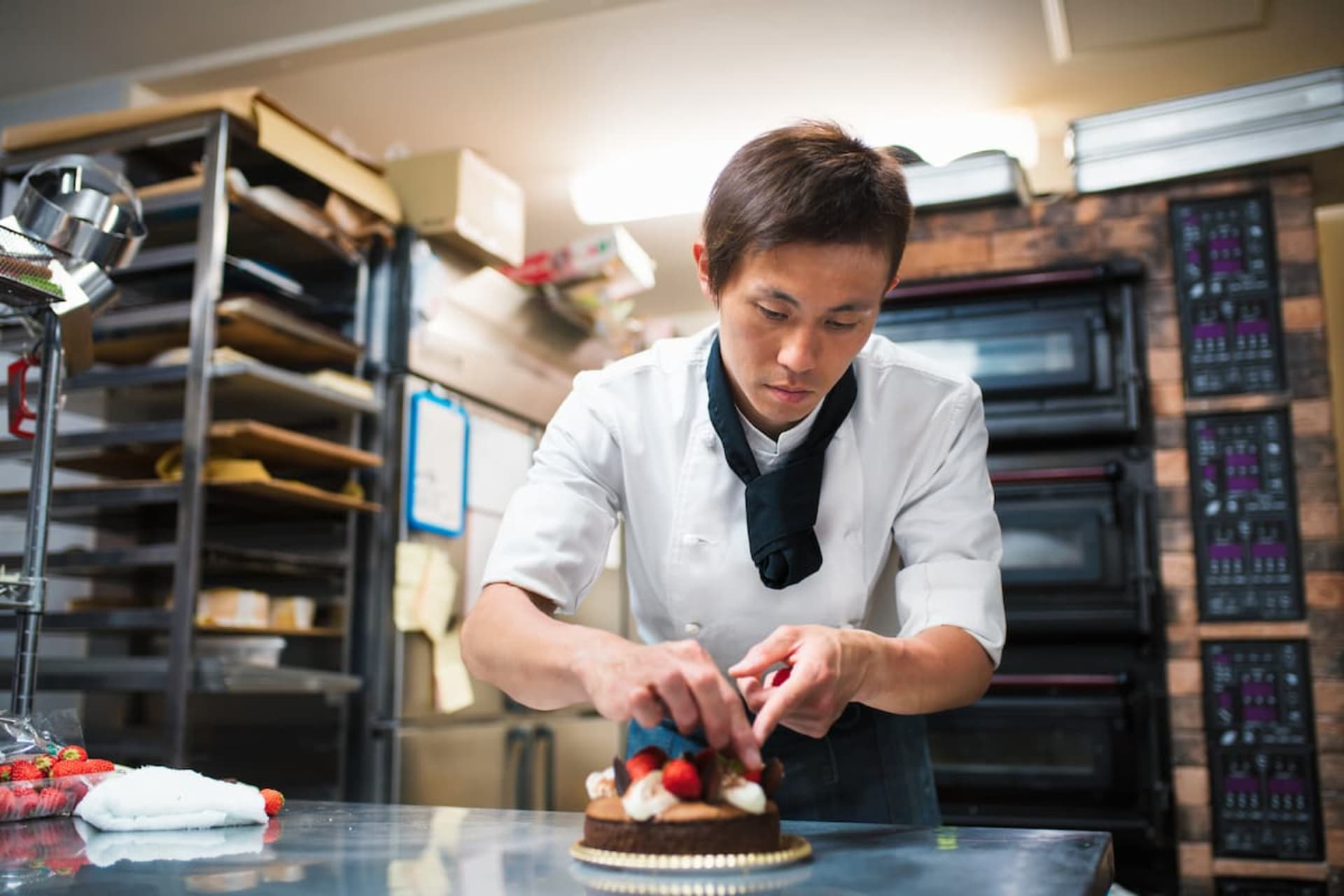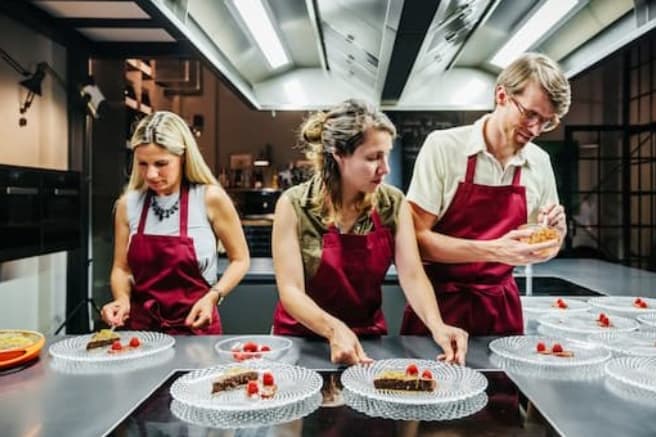How to get a degree in culinary arts

A culinary degree can open the door to a universe filled with flavors, creativity and endless possibilities, where food is not just a necessity but an art form. Culinary arts is the discipline of preparing, cooking and presenting food in a manner that is as much about aesthetics and sensory pleasure as it is about nourishment. It includes a broad range of skills, from basic cookery techniques to advanced gastronomic innovations, making it an enticing career path for those passionate about the culinary industry.
If you’re looking for a career in the kitchen, a culinary arts degree provides the foundational knowledge and hands-on experience needed to thrive, but it can be hard to know where to start. Join us as we look at how to get a degree in the culinary arts.
Different types of culinary arts degrees
There are various educational pathways you can choose from, each tailored to different goals and time commitments. Below is a comprehensive look at the types of degrees available for aspiring culinary professionals.
Associate degrees in culinary arts
A two-year program that combines general education with focused training. Students will learn fundamental cooking techniques, food preparation and kitchen management. The curriculum includes hands-on experience in professional kitchens, covering various cuisines and cookery methods. This qualification is ideal for those looking to enter the industry quickly, offering a solid foundation for roles such as line cook, pastry chef or even sous chef.
Bachelor's degrees in culinary arts
The most common undergraduate-level qualification, this degree program provides a more in-depth and comprehensive education over four years. A bachelor’s in culinary arts builds cookery skills and includes advanced studies in food science, nutrition, kitchen management and business. Students gain extensive practical experience and may participate in internships or study-abroad programs to learn about international cuisines. Graduates are well-prepared for higher-level positions such as executive chef, restaurant manager or culinary educator. This also opens doors to entrepreneurial ventures in the food industry.
Master's degrees and advanced certifications
For those aspiring to leadership or specialized positions in the culinary industry, focused academic and practical training is a must. A master’s degree in culinary arts or other relevant advanced certifications typically emphasize management, business strategy and cutting-edge culinary techniques. Students are expected to have a substantial foundation in culinary skills, while the coursework aims to prepare them for jobs such as food and beverage directors, culinary consultants or hospitality managers. Master's courses can be particularly beneficial for experienced professionals seeking to move into higher administrative or educational roles.
Diploma and certificate programs in culinary arts
Whether you are looking to learn a particular skill or you’re not sure if the culinary arts are for you, a shorter program could be the answer. Diploma and certificate programs are usually briefer, ranging from a few months to a year, and are designed for individuals seeking quick entry into the food industry or looking to build specific skills. These courses offer concentrated training in areas such as pastry arts, culinary techniques and plant-based cooking. They are highly practical, with a significant emphasis on hands-on learning. These credentials are ideal for current professionals looking to specialize or those needing a quicker, less comprehensive education to start working in commercial kitchens.

Choosing the right culinary program for you
To achieve your career aspirations in the food industry, selecting the right culinary program is essential. Before choosing your program, keep in mind the following important factors.
Accreditations
You need to ensure a culinary program meets industry standards and provides a high-quality education and accreditations guarantee this. Accredited programs are recognized by employers and can improve job prospects and further educational opportunities. Make sure to check the accreditation status of any school you consider, ensuring you receive credible and respected training.
Tailoring your education to your career goals
Your choice of culinary program should be guided by your ambitions. For those looking to enter the workforce quickly, diploma or certificate programs offer focused training in a shorter time frame, typically less than a year. These are ideal for entry-level opportunities and provide practical skills in specific areas. If you’re aiming for a comprehensive education and higher-level positions, consider an associate or bachelor’s degree. These courses offer broader knowledge and more extensive hands-on experience, preparing you for jobs such as executive chef or restaurant manager. Advanced degrees and certifications are suitable for those seeking to move into leadership or specialized roles in the industry.
The role of specializations
Choosing a niche allows you to tailor your education to specific interests in the gastronomic industry. Baking and pastry arts courses focus on bakery and dessert preparation, equipping you with the skills needed to become a pastry chef. Plant-based culinary programs cater to the growing demand for vegetarian and vegan food, teaching essential techniques and menu planning. Other specializations may include international cuisine, culinary management or holistic nutrition. Specializing can boost your expertise and make you more competitive in niche markets.
Studying at École Ducasse
Taking up an offer of study at École Ducasse is the start of a unique and prestigious culinary education, deeply rooted in the philosophy and expertise of the renowned Chef Alain Ducasse. The school is globally recognized for its excellence in teaching cookery and pastry arts, providing students with a comprehensive learning experience that combines technical skills, business acumen and hands-on practice.
École Ducasse offers a range of programs tailored to various career stages and aspirations. Its state-of-the-art facilities and highly experienced faculty ensure students receive excellent training. Chef instructors, who are professionals themselves, bring their passion and expertise into the classroom, providing personalized guidance and instilling in students a deep understanding of traditional and contemporary cookery practices. Whether you are a high school graduate aiming for a culinary role or a professional seeking to switch industries, École Ducasse provides the resources and support needed to excel in gastronomy.
Culinary school admissions: what you need to know
To gain entry to a culinary school you need to meet specific academic and age requirements.
For undergraduate programs at École Ducasse, a high school diploma or equivalent is typically required. For international students, certified translations of qualifications or academic transcripts may be necessary. Applicants must generally be at least 18 years old by the start of their placements, while younger candidates need parental consent. Preparing for admission involves gathering essential documents such as a current resume, a copy of your passport and a financial sponsor's declaration. Ensuring you meet these prerequisites is vital for a smooth application process.
The application process
Applying to culinary school at École Ducasse involves several steps. First, complete the application form carefully, including a personal statement explaining your motivation for pursuing the course. Pay any required fees promptly to avoid delays. After submission, your application will be reviewed and, if successful, you will be scheduled for an entry assessment, often conducted via video call. Following this, you'll receive your results within two weeks. If accepted, you must complete an admission package and make any necessary pre-payments to secure your spot.
Career opportunities with a culinary degree
A degree in culinary arts opens doors to a variety of career paths in the industry. Graduates can pursue roles such as pastry chefs, culinary managers, restaurant managers, food stylists or culinary consultants. The diversity of job opportunities reflects the comprehensive training provided by culinary programs, which cover everything from basic cooking techniques to advanced gastronomic skills and business management.
Earning potential and career growth
Earning potential in the industry varies based on the role and level of experience. For instance, a catering manager can expect to earn around $53,566 annually. This job involves planning and overseeing services for events, managing employees and ensuring customer satisfaction. At the higher end of the salary spectrum, executive and head chefs, who are responsible for menu creation, kitchen staff supervision and overall operations, can earn an impressive $95,100 per year. These positions also offer opportunities for career growth in the hospitality and food service industries.
Life after graduation: starting your culinary career
Graduating with a degree in culinary arts marks the beginning of an exciting journey in the gastronomic world. Armed with practical skills, theoretical knowledge and industry insights, new graduates are well-prepared to begin their careers. However, moving from student to professional requires strategic planning and proactive steps such as those outlined below.
Building a professional network
One of the most important steps after graduation is building a robust professional network. Connecting with fellow graduates, instructors and professionals can open doors to job opportunities and provide valuable mentorship. Attending trade events, joining culinary associations and participating in online communities can help you expand your connections. Leveraging social media platforms such as LinkedIn to showcase your skills and connect with industry leaders is also beneficial. A strong network can offer support, advice and referrals, which are invaluable as you navigate your early career.
Landing your first job in the industry
To secure a start in the culinary industry, begin by refining your resume and creating a compelling portfolio highlighting your relevant skills, internships and projects. Tailor your applications to specific roles and employers, emphasizing how your abilities and experiences make you an ideal candidate. Consider starting with an entry-level position, such as line cook or kitchen assistant, to gain practical experience and prove your capabilities. Prepare for interviews by practicing common interview questions and demonstrating your passion for the trade. Persistence and a positive attitude will go a long way in landing your first job and setting you on the road to success.
Conclusion
A culinary career offers creativity, technical development and endless opportunities. Studying for a degree in culinary arts provides the essential foundation to excel in various roles in the food industry, from cooking and baking to management and entrepreneurship. Choosing the right educational program that aligns with your goals and interests is important for success. There are a range of options, including bachelor’s and master’s degrees and short certificates.
Choosing the right school is also important, so look for one with professional accreditations. By carefully selecting your educational pathway, you can set the stage for a successful and fulfilling career in the culinary world, wherever it takes you.


